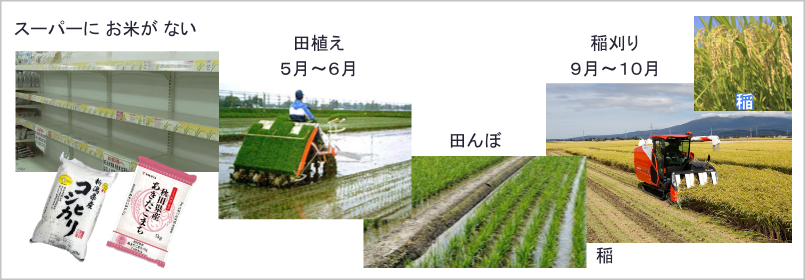

今年(2024年)の 6月ごろから お米の 値段が 上がり始めました。
そして、「今年は お米が 足りないかも しれない」と 言われ始めました。
日本では 5月から 6月に 田植えを します。
「田植え」とは 田んぼに 稲を 植える ことです。
そして、9月から 10月に 稲刈りを します。
「稲刈り」とは「お米の 収穫」の ことです。

ですから、10月までは、お店で 売っている お米は 前の 年に 採れた お米です。
去年(2023年)は 猛暑の 影響で お米が あまり 採れませんでした。
その ため、今年の 6月ごろから お米が 品薄に なって、値上がり しました。

さらに、8月8日、九州で やや 強い 地震が ありました。
気象庁は「巨大 地震が 起きるかも しれないから、注意して」と 呼びかけました。
すると、次の 日、スーパーから お米が 消えました。
たくさんの 人が 買いだめを したからです。
それから 1か月 経ちますが、スーパーには 依然 お米が ありません。
運良く あっても、値段は 通常の 1.5倍ぐらいです。
政府は「お米は 十分 あるから、買いだめ しないで ください」。
「10月に なれば、新米が 出ます」と 呼びかけて います。
でも、今年の 夏も 記録的な 猛暑でした。
さらに、全国 各地で 大雨が 降って、農産物に 大きな 被害が 出ました。
もし、今年 お米が 十分 採れなかったら、
来年の 今ごろ 日本は 深刻な 米不足に なるかも しれません。
Practice Each Sentence


 |
1. |
|
ことし this year, にせん・にじゅう・よ・ねん year 2024, ろくがつ June
-ごろ around (time), -から from, おこめ/こめ (uncooked) rice, ごはん (cooked) rice / meal
ねだん price, あがります to go up, rise, [stem] + はじめます to start to do, begin to do
今32,年28,月20,米176,値198,段197,上41,始379


 |
2. |
| ことし | | こめ | | た | |
| そして、「 | 今年 | はお | 米 | が | 足 | りないかもしれない」と |
|
そして and, ことし this year, おこめ/こめ (uncooked) rice
たりない nai form of tariru; be not enough, be short, be lacking
-かも しれない probably, maybe, perhaps, possibly, -と quotation marker; ".....", that
いわれます passive form of iimasu; be said, be told, [stem] + はじめます to start to do, begin to do
今32,年28,米176,足60,言121,始379


 |
3. |
| に | ほん | | がつ | | がつ | | た | う | |
| 日 | 本 | では5 | 月 | から6 | 月 | に | 田 | 植 | えをします。 |
|
にほんで in Japan, ごがつ May, -から from, ろくがつ June, -に specific time marker; in, at, on
た・うえ rice-planting, たんぼ rice field, rice paddies, うえます to plant (tree, flower, vegetable)
日19,本51,月20,田67,植966


 |
4. |
| た | う | | た | | いね | | う | |
| 「 | 田 | 植 | え」とは | 田 | んぼに | 稲 | を | 植 | えることです。 |
|
た・うえ rice-planting, [A] とは [B] の こと [A] means [B], -と quotation marker; ".....", that
田67,植966,稲1386


 |
5. |
| がつ | | がつ | | いね | か | |
| そして、9 | 月 | から10 | 月 | に | 稲 | 刈 | りをします。 |
|
そして and, くがつ September, じゅうがつ October
いね・かり rice harvesting, rice reaping, いね rice plant, かります to cut, mow, reap, trim
月20,稲1386,刈1368


 |
6. |
| いね | か | | こめ | しゅうかく | |
| 「 | 稲 | 刈 | り」とは「お | 米 | の収穫」 | のことです。 |
|
いね・かり rice harvesting, rice reaping, -と quotation marker; ".....", that
[A] とは [B] の こと [A] means [B]
稲1386,刈1368,米176,収320,穫1489


 |
7. |
| みせ | | う | | こめ | | まえ | | とし | | と | | こめ | |
| お | 店 | で | 売 | っているお | 米 | は | 前 | の | 年 | に | 採 | れたお | 米 | です。 |
|
ですから therefore, -まで to, till, until, おみせ store, shop, restaurant, -で place marker; in, at
うっている (place de something o +) they sell, store sells, おこめ/こめ (uncooked) rice
まえの とし the previous year, the year before, まえの former, previous
とし year, -に specific time marker; in, at, on, とれた ta form of toreru; be produced, be caught, be yielded
月20,店192,売191,米176,前106,年28,採593


 |
8. |
| もうしょ | えいきょう | | こめ | | と | |
| 猛暑 | の影響で | お | 米 | があまり | 採 | れませんでした。 |
|
きょねん last year, にせん・にじゅう・さん・ねん year 2023
もうしょ extremely hot, intense heat, scorching heat, -の えいきょうで due to, because of (the influence of)
えいきょう [sv] influence, effect, affect, -で cause marker; by, because, due to
おこめ/こめ (uncooked) rice, あまり (+ negative) not very, not much, not so
とれます to be produced, be caught, be yielded
去385,年28,猛1673,暑206,影697,響698,米176,採593


 |
9. |
| ことし | | がつ | | こめ | | しなうす | |
| そのため、 | 今年 | の6 | 月 | ごろからお | 米 | が | 品薄 | になって、 |
|
その ため because of that, ことし this year, ろくがつ June
しなうす shortage of supply, short supply, なって te form of -ni naru; become, come to
ね・あがり [sv] rising in price, increase in price, ねだん price, あがります to go up, rise
今32,年28,月20,米176,品194,薄854,値198,上41


 |
10. |
| がつ | ようか | きゅうしゅう | | つよ | | じ | しん | |
| さらに、8 | 月 | 8日 | 、九州で | やや | 強 | い | 地 | 震 | がありました。 |
| |
| さらに、8月8日、九州でやや強い地震がありました。 |
|
さらに moreover, besides, はちがつ August, ようか 8th. of the month
きゅうしゅう Kyuushuu island, -で place marker; in, at, やや a little, a bit, slightly, somewhat
つよい strong, powerful, じしん earthquake, あります there is, to have, happen
月20,日19,九9,州752,強277,地148,震713
The following audio is available to members


 |
11. |
| きょだい | じ | しん | | お | | ちゅうい | |
| 「 | 巨大 | 地 | 震 | が | 起 | きるかもしれないから、 | 注意 | して」と |
|
きしょう・ちょう Japan Meteorological Agency, きしょう weather, meteorological phenomena
きょだい [na] huge, じしん earthquake, おきる to happen, occur
-かも しれない probably, maybe, perhaps, possibly, -から because
ちゅうい して(ください)please pay attention, please be careful
ちゅうい [sv] pay attention, be careful, watch, -て ください Please do
-と quotation marker; ".....", that, よびかけます to call attention, appeal, warn
気83,象619,庁1208,巨1109,大36,地148,震713,起781,注491,意492,呼971


 |
12. |
| つぎ | | ひ | | こめ | | き | |
| すると、 | 次 | の | 日 | 、スーパーからお | 米 | が | 消 | えました。 |
|
すると then, つぎの ひ (the) next day, the following day, つぎ next, following, ひ day, date
スーパー supermarket, grocery store, -から from, おこめ/こめ (uncooked) rice, きえます to disappear, go out
次370,日19,米176,消190


 |
13. |
|
たくさんの ひと many people, a lot of people, たくさん many, a lot of, ひと person, people
かいだめ [sv] stock up, panic buying, かいます to buy, -から because
人46,買119


 |
14. |
|
それから after that, since that, いっかげつ (for) one month
[time] たちます [time] pass, -が a conjunction meaning "but"
スーパー supermarket, grocery store, -に place marker; in, at, on
いぜん still, おこめ/こめ (uncooked) rice, あります there is, to have
月20,経311,依449,然305,米176


 |
15. |
| うん | よ | | ね | だん | つうじょう | | ばい | |
| 運 | 良 | くあっても、 | 値 | 段 | は通常の | 1.5 | 倍 | ぐらいです。 |
|
うん・よく luckily, うん luck, fortune, よく ku form of ii; good, well
あって te form of aru; there is, have, -ても even, even if
ねだん price, つうじょう usual(ly), normal(ly), いってん・ご・ばい 1.5 times
-てん dot, point, decimal point, -ばい double, times as (much, many, long, high) as
-ぐらい/-くらい about, approximately
運371,良219,値198,段197,通145,常528,倍860


 |
16. |
| こめ | じゅうぶん | | か | |
| 「お | 米 | は十分あ | るから、 | 買 | いだめしないでください」。 |
| |
| 「お米は十分あるから、買いだめしないでください」。 |
|
せいふ government, じゅうぶん [na] enough, ある there is, to have, -から because
かいだめ [sv] stock up, panic buying, -ないで ください please do not do
政556,府558,米176,十10,分29,買119


 |
17. |
| がつ | | しんまい | | で | |
| 「10 | 月 | になれば、 | 新米 | が | 出 | ます」と |
|
じゅうがつ October, なれば ba conditional form of naru; become, come to
しん・まい new rice, しん- new (something), でます to come out, appear / be brought, be given, be served
-と quotation marker; ".....", that, よびかけて te form of yobikakeru; call attention, appeal
-て います expressing progressive or state
月20,新216,米176,出48,呼971


 |
18. |
| ことし | | なつ | | き | ろくてき | | もうしょ | |
| でも、 | 今年 | の | 夏 | も | 記 | 録的 | な | 猛暑 | でした。 |
|
でも but, however, ことし this year, なつ summer, -も also, too
きろくてき [na] record-breaking, record-setting, もうしょ extremely hot, intense heat, scorching heat
今32,年28,夏202,記546,録548,的465,猛1673,暑206


 |
19. |
| ぜんこく | かく | ち | | おおあめ | | ふ | |
| さらに、 | 全国 | 各 | 地 | で | 大雨 | が | 降 | って、 |
| のうさんぶつ | | おお | | ひ | がい | | で | |
| 農産物 | に | 大 | きな | 被 | 害 | が | 出 | ました。 |
|
さらに more, moreover, ぜんこく whole country, nationwide, かくち each placee / many places
-で place marker; in, at, おお・あめ heavy rain, おお- big, large / very
あめが ふる it rains, ふって te form of furu; fall (rain, snow)
のうさんぶつ agricultural products, farm products, おおきな big, large / great, serious
ひがいが でます have damege, be damaged, suffer damage, ひがい damage, harm
でます to come out, appear / have damage
全161,国163,各240,地148,大36,雨84,降362,農851,産268,物252,被628,害627,出48


 |
20. |
| ことし | | こめ | じゅうぶん | と | |
| もし、 | 今年 | お | 米 | が十分 | 採 | れなかったら、 |
| らいねん | | いま | | に | ほん | | しんこく | | こめ | ぶ | そく | |
| 来年 | の | 今 | ごろ | 日 | 本 | は | 深刻 | な | 米 | 不 | 足 | になる |
|
もし used with -tara and emphasizes "if"
ことし this year, おこめ/こめ (uncooked) rice, じゅうぶん [na] enough
とれなかった nakatta form of toreru; be produced, be caught, be yielded, -たら if, when
らいねんの いまごろ around this time next year, いまごろ about this time
しんこく [na] serious, こめぶそく rice shortage, -ぶそく shortage, be short (comes from "Fusoku")
-に なる to become, come to, it will be, -かも しれません probably, maybe, perhaps, possibly
今32,年28,米176,十10,分29,採593,来33,日19,本51,深663,刻828,不230,足60
Drills & Vocabulary


Functional patterns used in the sentences (Chapter numbers are from Building Up Conversation)
o-kome no nedan ga agari-hajimemashita / iware-hajimemashita
verb stem + -hajimemasu:start to do
Level 3 Chapter 13
o-kome ga tarinai kamo shirenai / kyodai jishin ga okiru kamo shirenai / kome-busoku ni naru kamo shiremasen
plain form + kamo shiremasen:expressing possibility; possibly, probably, could be, may be
Level 2 Chapter 8
kyodai jishin ga okiru kamo shirenai kara, chuui shite / kaidame o shita kara desu / o-kome wa juubun aru kara
plain form + kara / -da kara:expressing a reason or a cause; because, therefore, so
Level 2 Chapter 3
chuui shite (kudasai) / kaidame shinaide kudasai
verb te form (-nai form) + -te kudasai (-naide kudasai):please do / please don't do
Level 2 Chapter 5
kome-busoku ni naru kamo shiremasen / o-kome ga shinausu ni natte
-ku narimasu / -ni narimasu:become, come to
Level 2 Chapter 9
omise de utteiru o-kome / mae no toshi no toreta o-kome
phrase + noun:Noun Modifier
Level 2 Chapter 13
omise de utteiru o-kome
verb te form + -te imasu:expressing the progressive, a state of being or a habitual action
Level 2 Chapter 4
zenkoku kakuchi de oo-ame ga futte / o-kome ga shinausu ni natte
te form -te / -kute / -de:used as a conjunction "and", also indicate a reason or cause; because, due to
Level 2 Chapter 6
unyoku atte mo
te form + mo, (-temo / -demo):even, even if, even though
Level 2 Chapter 8
10-gatsu ni nareba, shinmai ga demasu
ba form ; -ba,:ba conditional form; If
Level 2 Chapter 15
kotoshi o-kome ga juubun torenakattara
ta form + -tara:if, when
Level 2 Chapter 8







































